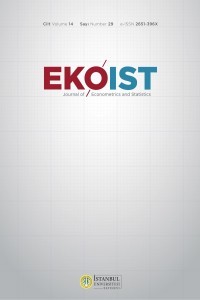Finansal Gelişme ve Gelir Eşitsizliği Arasındaki İlişkinin Gelişmiş ve Gelişmekte Olan Ülkeler İçin Araştırılması: Kanonik Korelasyon Analizi Uygulaması
Finansal Gelişme, Gelir Eşitsizliği, Kanonik Korelasyon Analizi, Mardia Test
Investigating the Relationship Between Financial Development and Income Inequality in Developed and Developing Countries: An Application of Canonical Correlation Analysis
___
- Albayrak, A.S. (2006). Uygulamalı Çok Değişkenli İstatistik Teknikleri, Ankara: Asil Yayın Dağıtım. google scholar
- Arora, R. U. (2011). Finance and Inequality: A Study of Indian States. Applied Economics, 44(34), 4527-4538. D01:10.1080/00036846.2011.597736 google scholar
- Angori, G., Aristei, D., Gallo, M. (2019). Determinants of Banks’ Net Interest Margin: Evidence from the Euro Area during the Crisis and Post-Crisis Period. Sustainability, 11(14), 3785. D0I:10.3390/su11143785 google scholar
- Banerjee, A. V., Newman, A. F. (1993). 0ccupational Choice and the Process of Development. Journal of Political Economy, 101(2), 274-298. D0I:10.1086/261876. google scholar
- Bektaş, H., Tekin, M. (2013). The Relationship of Financial Ratios and Stock Exchange Performance Ratios: Canonical Correlation Analysis of Banks Trading in Istanbul Stock Exchange. Marmara University Journal of I.I.B, 34(I), 317-329. https://dergipark.org.tr/en/download/article-file/3863 google scholar
- Bittencourt, M., Chang, S., Gupta, R., Miller, S. (2019). Does Financial Development Affect Income Inequality in the U.S. States?. Journal of Policy Modeling, 41(6), 1043-1056. https:// doi.org/10.1016/j.jpolmod.2019.07.008 google scholar
- Chiu, Y.B., Lee, C.C. (2019). Financial Development, Income Inequality, and Country Risk. Journal of International Money and Finance, 93(1), 1-18. DOI: 10.1016/j.jimonfin.2019.01.001. google scholar
- Chung, P.K., Zhao, Y., Liu, J.D., Quach, B. (2017). A Canonical Correlation Analysis On The Relationship Between Functional Fitness And Health-Related Quality Of Life İn Older Adults. Archives of Gerontology and Geriatrics, 68, 44-48. https://doi.org/10.1016/j.archger.2016.08.007 google scholar
- De Gregorio, J. (1996). Borrowing Constraints, Human Capital Accumulation and Growth. Journal of Monetary Economics, 37(1), 49-71. https://doi.org/10.1016/0304- 3932(95)01234-6 google scholar
- Fornell, C., Larcker, D. F. (1980). The Use of Canonical Correlation Analysis in Accounting Research. The Journal of Business Finance and Accounting, 7(3), 455-470. DOI: 10.1111/ j.1468-5957.1980.tb00213.x google scholar
- Galor, O., Zeira, J. (1993). Income Distribution and Macroeconomics. The Review of Economic Studies, 60(1), 35-52. https://doi.org/10.2307/2297811 google scholar
- Greenwood, J., Jovanovic, B. (1990). Financial Development, Growth, and the Distribution of Income. The Journal of Political Economy, 98(5), 1076-1107. http://piketty.pse.ens.fr/files/ GreenwoodJovanovicJPE1990.pdf google scholar
- Güler, E.Ö., Şanlı, S. (2019). A Comparison of Canonical Correlation Analysis Results on 20152016 Social Progress Indexes. Ankara Hacı Bayram Veli Üniversitesi İktisadi ve İdari Bilimler Fakültesi Dergisi, 21(2), 185-204. https://dergipark.org.tr/tr/download/article-file/792408 google scholar
- Hair, F. J., Black, W.C., Babin, B.J., Anderson, R.E. (1998). Multivariate Data Analysis, London: Prentice-Hall International Inc. google scholar
- Hotelling, H. (1936). Relations Between Two Sets of Variates. Biometrika, 283(4), 321-377.DOI: 10.1093/biomet/28.3-4.321 google scholar
- Jauch, S., Watzka, S. (2015). Financial Development and Income Inequality: A Panel Data Approach. EmpiricalEconomics, 51 (1), 291-314. D01:10.1007/s00181-015-1008-x google scholar
- Johnson, R.A., Wichern, D.W. (2007). Applied Multivariate Statistical Analysis. 6th Edition, Pearson Prentice Hall, Upper Saddle River. google scholar
- Kappel, V. (2010). The Effects of Financial Development on Income Inequality and Poverty, Center of Economic Research at ETH Zurich Working Paper, 10/127, 1-40. https://papers.ssrn.com/ sol3/papers.cfm?abstract_id=1585148 google scholar
- Lee, H.S. (2007). Canonical Correlation Analysis Using Small Number of Samples. Communications in Statistics. Simulation and Computation, 36(5), 973- 985. D0I:10.1080/03610910701539443 google scholar
- Naceur, B.S., Zhang, R. (2016). Financial Development, Inequality and Poverty. IMF Working Paper, 1-28. https://www.imf.org/external/pubs/ft/wp/2016/wp1632.pdf. google scholar
- Nurkovic, N., Imamovic, D., Ecin Mirvic, T. (2021). The Canonical Connection of Motor Skills and Performance of Technical Elements of Goal Shooting in Water Polo. Sportski Logos, 34-37. https:// www.researchgate.net/profile/Indira-Mahmutovic/publication/357743975_DIFFERENCES_ IN_STUDENTS_’ATTITUDES_T0_PHYSICAL_ACTIVITY_AND_SATISFACTI0N_ WITH_HEALTH_STATUS/links/61dd7ae34e4aff4a643479e7/DIFFERENCES-IN-STUDENTS-ATTITUDES-T0-PHYSICAL-ACTIVITY-AND-SATISFACTI0N-WITH-HEALTH-STATUS.pdf#page=36 google scholar
- 0dhiambo, N.M. (2020). Financial Development, Income Inequality and Carbon Emissions in Sub-Saharan African Countries: A Panel Data Analysis. Energy Exploration & Exploitation, 38(5), 1914-1931. D0I: 10.1177/0144598720941999 google scholar
- Oktay E., Kaynak S. (2007). Türkiye ve Avrupa Birliği Ülkelerinin Bilgi Ekonomisi Girdi Ve Çıktı Değişkenleri Arasındaki Kanonik İlişkinin Araştırılması. Atatürk Üniversitesi Sosyal Bilimler Enstitüsü Dergisi, 10(2), 419-440. http://static.dergipark.org.tr/articledownload/ imported/1020000451/1020000445.pdf? google scholar
- Park, D., Shin, K. (2017). EconomicGrowth, FinancialDevelopment, andIncomeInequality, Emerging Markets Finance and Trade, 53(12), 2794- 2825. DOI: 10.1080/1540496X.2017.1333958. google scholar
- Perugini, C., Tekin, P. (2020). Financial Development, Income Inequality and Governance Institutions. Panoeconomicus, 69(1). http://www.panoeconomicus.org/index.php/jorunal/ article/view/937/582 google scholar
- Sharma, S. (1996). Applied Multivariate Techniques, New York: John Wiley & Sons. google scholar
- Sherry, A., Henson, R.K. (2005). Conducting and Interpreting Canonical Correlation Analysis in Personality Research: A User-Friendly Primer. Journal of Personality Assessment, 84(1), 37-48. DOI: 10.1207/s15327752jpa8401_09 google scholar
- Statheropoulos, M., Vassiliadis Al, N., Pappa Al, A. (1998). Principal Component and Canonical Correlation Analysis for Examining Air Pollution and Meteorological Data, Atmospheric Environment, 32(6), 1087-1095. https://doi.org/10.1016/S1352-2310(97)00377-4 google scholar
- Tacq, J. (1997). Multivariate Analysis Techniques in Social Science Research: From Problem to Analysis, Rotterdam: Sage Publications Ltd. google scholar
- Thompson, B. (1984). Canonical Correlation Analysis: Uses and Interpretation (Quantitative Applications in the Social Sciences), California: Sage Publications, Inc. google scholar
- Ünlükaptan İ. (2009). Avrupa Birliği Üyesi Ülkelerde İktisadi Kalkınma, Rekabetçilik ve İnovasyon İlişkilerinin Kanonik Korelasyon Analizi ile Belirlenmesi. Maliye Dergisi, 157, 235-250. https:// ms.hmb.gov.tr/uploads/2019/09/15.%C4%B0lter.UNLUKAPLAN.pdf google scholar
- Zungu, L.T., Grelying, L. (2021). Financial Development and Income Inequality: A Nonlinear Econometric Analysis of 21 African Countries, 1994-2015, Economic Research google scholar
- Başlangıç: 2005
- Yayıncı: İstanbul Üniversitesi
Teknik Etkinsizlik Kaynaklı Üretim Kayıpları: BRICS-T Ülkeleri Örneğinde Bir Panel Veri Analizi
Ndilo FWARU, Alii LEONARD, Mwambi JERİTA, Cyril OTULO
Veri Bilimi İçin Yeni Bir Programlama Dili: Julia
Ünal Halit ÖZDEN, Münevver TURANLI
Hatice Gül BOZDEVECİ, Özlem YORULMAZ
Ülkelerin Gelişmişlik Düzeylerinin Karar Ağacı ve Rastgele Orman Yöntemleriyle Tahmin Edilmesi
Batuhan ÖZKAN, Coşkun PARİM, Erhan ÇENE
Health Econometrics Research: A Bibliometric Analysis from 1991 to 2020
